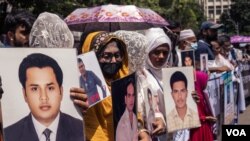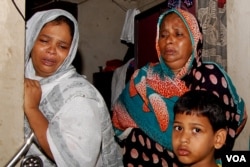Rights activists and relatives of victims of alleged human rights violations by members of Bangladesh’s notorious Rapid Action Battalion, an elite security force, are urging the United States to continue sanctions against the nation’s law enforcement agencies.
The calls come after a visit by U.S. Assistant Secretary of State for South and Central Asian Affairs Donald Lu, who said January 15 the U.S. had not implemented new sanctions on the RAB because the force had made good progress in the area of human rights, by reducing extrajudicial killings in the country.
The activists, who have long campaigned against the country’s law enforcement agencies — alleging they had been involved in thousands of cases of enforced disappearance and extrajudicial killing — and the families of the victims of alleged rights violation said that they were disappointed the United States has not implemented new sanctions on other Bangladeshi security agencies and more former and present RAB officers.
Washington imposed human rights-related sanctions on the RAB and six former and then-serving officers in December 2021, accusing them of responsibility for thousands of extrajudicial killings and enforced disappearances in the country.
Lu, after meeting January 15 with Bangladesh Foreign Minister AK Abdul Momen, told a local TV channel, “One of the things I said to the partners [in Bangladesh] today is, normally on the anniversary of the sanction like the sanction on RAB, we would have designated more individuals from the RAB to face individual sanctions. …We didn’t do that because we recognize the progress being made by the [Bangladeshi] government and by the RAB itself to reform.”
Lu did not say whether or when RAB sanctions would be lifted, but a day after meeting with Lu, Momen told reporters he was hopeful the sanctions imposed on the RAB and its officers would be removed.
“They hinted that Bangladesh is working in the right direction and it would perhaps take some time but the sanctions would be removed,” Momen said, apparently referring to Lu or U.S. officials.
Meenakshi Ganguly, the South Asia director of Human Rights Watch said that while it was true that gross violations by the RAB dropped briefly immediately after the sanctions were announced, that only goes to show that when there is accountability, the security forces can be reined in.
“The fact that security forces abuses started again is because of denials and excuses by the political leaders who failed to deliver a robust effort to end impunity. The U.S. and other governments should be concerned by reports of intimidation of activists and victim families after the sanctions were announced, and not hesitate to act if abuses persist,” Ganguly told VOA.
Many have expressed frustration after Lu explained why the U.S. had not designated new sanctions on Bangladesh and the Bangladeshi ministers said that they believed that the existing US sanctions would be revoked.
“RAB has forcibly disappeared hundreds of BNP activists, including two former MPs and dozens of leaders, of whom more than 50 have yet to return. The members of this organization have extrajudicially killed thousands of people in the country, including BNP leaders, activists and supporters; the officials responsible for these murders have not yet been tried,” Gayeshwar Chandra Roy, a senior leader of the opposition Bangladesh Nationalist Party, told VOA.
“Instead, we have seen the Bangladeshi government hand out gallantry awards and prize postings to those whom the United States has sanctioned for their crimes against humanity.
“In this situation, if the sanctions are lifted, people of different opinions in Bangladesh will be victims of extrajudicial killing and enforced disappearance by RAB again.”
A woman who refused to be identified, fearing reprisals from security agents and said her husband has not returned home since he was abducted by a branch of police before the 2014 national elections, told VOA, “We all believed that the American authorities knew it well that, different wings of the police and other agencies were involved in a serious level of rights violation in Bangladesh, too. After the sanctions were imposed on the RAB, we were hopeful that more sanctions would follow through targeting other agencies.”
“It appears now that no new sanctions will come from the U.S. We will not get justice…This is very disappointing.”
Mohammad Ashrafuzzaman, liaison officer of the Hong Kong-based Asian Legal Resource Center said, the Sheikh Hasina government continually uses all the agencies of the state including the judiciary to curb rights in Bangladesh, even after the RAB sanctions.
“The systematic denial of access to justice has turned into a norm in Bangladesh. The human rights situation in the country cannot improve until an effectively functional mechanism of accountability is brought in place,” Ashrafuzzaman told VOA.
“To protect the defenseless victims and the human rights defenders, who have no resort to go within the country’s boundary, there should be more sanctions on the perpetrating entities.”
Amanda Strayer, supervising staff attorney for accountability at the U.S.-based rights group Human Rights First, noted the RAB and several of its officers were sanctioned under the Global Magnitsky Act, which authorizes sanctions against human rights violators for widespread and longstanding patterns of extrajudicial killings, enforced disappearances, and torture under the Global Magnitsky program.
“The U.S. government should make very clear that there can be no discussion about lifting sanctions until Bangladesh implements serious reforms to prevent these kinds of horrific violence, to hold the sanctioned officers and all other abusers accountable, and to cease the ongoing threats and harassment against civil society and victims’ families,” Strayer told VOA.
The U.S. government risks undermining the impact of its own Global Magnitsky sanctions when it touts a temporary decline in violence early last year as 'tremendous progress,' absent real reform and accountability, she said.
“If repressive governments sense they can easily hoodwink the U.S. into backing down from Global Magnitsky sanctions without meaningful change, then human rights sanctions will lose all their bite,” she said.









